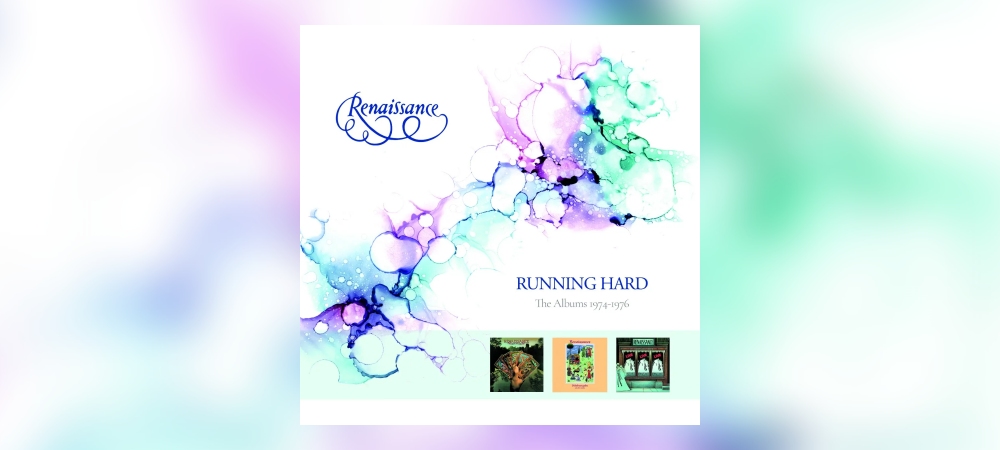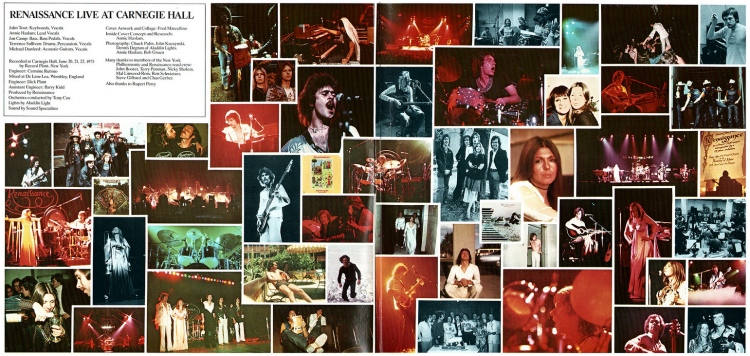Another day, another Renaissance release. It seems as if Esoteric has gone slightly bonkers with their treatment of the symphonically inclined prog favourites, but it’s no surprise that this extremely talented group are the darlings of their collection.
Instead of one mega box set with all the albums, it appears as if Esoteric is taking the approach of portioning the Renaissance catalogue into bite-sized clamshell boxes – if you can call four CDs ‘bite-sized’. And surely, this one in particular would be an easy sell; two of the band’s best albums (arguably the best), followed by a spectacular live album that seamlessly blends the band and orchestra.
We start with 1974’s Turn of the Cards, conveniently skipping the awkward transition era and the new band finding their feet. In the liner notes, they already sound established and ready for bigger and better things. Haslam and co. are very emphatic that Turn of the Cards was light years ahead of anything they’d done before and that they were stepping into a new realm of composition; personally, I always saw this album as an Ashes Are Burning, Part 2, as both albums are similarly structured: six tracks, with two long songs bookending each. Occasionally, I even forget which song belongs to which album, like with Things I Don’t Understand, which definitely seemed like an earlier piece to me. I like the song just fine, but I never understood why it sounded like two disparate songs rammed together; a bit more cohesiveness would have gone a long way.
I only learned just now that the piano piece that begins the track Running Hard (and thus, the album) is actually a cover of the 1937 piece Litanies, written for the organ by French composer Jehan Alain, who was killed in World War II just three years later. It’s a fantastic piece, and I feel that it works much better in the prog setting on piano with bass as accompaniment. After the driving verse section, there’s another instrumental section, which incorporates the orchestra perfectly, this time covering Mr. Pine by the transitional version of the group. Interestingly enough, very few British listeners would have heard Mr. Pine at this point, as the Illusion album was only released in the UK in 1977, seven years after it had been recorded. I personally enjoy the way the band incorporates this theme, making it better than its original psychedelic incarnation and making the different eras of the group feel interconnected.
Cold Is Being takes the classical adaptations perhaps a bit too far, as the song is literally Adagio in G Minor with some Annie Haslam vocals sprinkled on top. The Adagio itself has a fascinating history, apparently written by a 20th-century musicologist as a hoax and attributed to a more famous 18th-century composer just to make more sales. As soon as you put on Cold Is Being, you’ll likely recognise it from another film or TV series, as it has remained popular ever since it was published in 1958.
Running Hard is good, and possibly the more progressive song on the album, but Mother Russia is the album’s masterpiece, with a piercing theme about communism’s lack of regard for humanity and individuality inspired by the novel One Day in the Life of Ivan Denisovich, a story that involved Stalinist repressions. Lyricist Betty Thatcher was so moved by this book that she wrote some of her best lyrics ever, simple yet exacting. The band, in turn, wrote their music to capture the frigid atmosphere and powerful sadness of being a poor worker in Russia. The central instrumental is not complicated but features an exquisite crescendo that lasts for several minutes before a final chorus. At this point during the Cold War, Russia might have seemed like an easy target, but man, what an excellent take this was by both Thatcher and the group.
Next in this collection is 1975’s Scheherazade and Other Stories, which I already covered extensively in my review of Esoteric’s 2021 three-disc reissue. If you want my full thoughts on this album, you can read them there, but I will say, compared to Turn of the Cards, this is an incredibly lop-sided album. I rarely consider playing any of the tracks on Side One, but I will gladly play Song of Scheherazade at the drop of a hat, even if it is nearly 25 minutes long. It’s a shame that this box set includes no bonus tracks. Even the casual listener might be intrigued by the radically different single version of Ocean Gypsy.
The box is capped off with the double-disc Live at Carnegie Hall, recorded in New York City in June 1975, just before Scheherazade and Other Stories was released. Though the band had played a gig in New Jersey earlier the same month, this time they were headlining a three-night stint at the auspicious Carnegie Hall, replete with an orchestra to make their songs come to life. From the liner notes, the band had to pinch themselves that this was really happening to them, and what a fantastic achievement this was for the group and progressive rock in general.
To me, this album really represents the peak of Renaissance, performing their best material in a world-class venue backed by an incredible orchestra. After this, they would never quite recover, much as they would try. There was just no way to top this. But they had a blast on this occasion, opening with their classic instrumental, Prologue.
While the previous CDs did not include bonus tracks, you’ll be pleased to know this version does reinstate the excellent and remarkably progressive Kiev, which was absent from the original vinyl and some earlier CD editions (frustratingly, it’s not available on Spotify either, so this one track might be a genuine incentive for a completionist to purchase the set). However, the late Malcolm Dome’s note about this – “This rarity has never appeared on CD before” – proves that his notes here were simply copied and pasted from Esoteric’s 2019 edition.
After Kiev (not yet spelled ‘Kyiv’), the band run through their best ten-minuters – Can You Understand?, Running Hard and Mother Russia – pausing only for the pastoral Carpet of the Sun. It’s an excellent setlist, no notes.
After a break (both for the band and in physical media), Jon Camp (who sadly passed away last December) gives a rather lengthy introduction to the upcoming piece, which had not yet been released on vinyl. Although it does go on for a while, I appreciate his delivery of the story, as it shows where the group were coming from with it. He also doesn’t take himself too seriously and laughs at how daft this old tale can be with its unnecessarily ruthless sultan.
It’s a rather coy way to introduce one of the best progressive suites from the 70s. I cannot imagine how astounding it would be to be an audience member and hear Song of Scheherazade for the first time as performed by band and orchestra (remember, the album would not appear on shelves for another month). Even over the speakers, it sounds absolutely mind-blowing with the orchestra hitting each note perfectly. In later concerts, sans orchestra, the band would have to resort to a tape recording of the orchestra for one of the central parts of the song, which simply sounds flat compared to this opulent live version. With each part sounding just as good live as it does on the record, it’s a transcendent experience, especially when it’s capped off by Haslam confidently hitting her high note at the conclusion of the suite.
Not so transcendental is the band’s encore, a 24-minute version of Ashes Are Burning (yes, twice as long as the original). I love the original song, but here it’s stretched to absolute breaking point with a lengthy bass solo (you don’t hear too many of those, to be fair) and an extended outro. I already lamented this in the Scheherazade review, but the issue with this outro in the live version is that it lacks the searing guitar solo (originally played by Andy Powell of Wishbone Ash) that made the studio version perfect. Without it, the outro simply feels empty, and the fact that they extend this outro to be more than five minutes long is utterly galling. Still, it’s not as long as it is on the Nottingham University recording where it went on for seven minutes.
To my surprise, Annie Haslam herself also wasn’t a fan of Ashes are Burning being part of the setlist, with a similar feeling that it went on too long and that they could have played at least two or three other songs in that time. I wouldn’t necessarily want them to play any other songs, as I feel all the ‘hits’ had already been played, I simply feel that the execution of the song was subpar. Had they hired a guest guitarist (there must be thousands of budding young musicians in NYC waiting to step into the role), it could have been a magical finale.
The artwork is nicely recaptured on the slip cases for the studio albums but Live at Carnegie Hall gets some odd treatment as the discs come in two separate, nearly identical slip cases; a miniature gatefold sleeve would have worked much better. As it stands, the collage of images from the original inner gatefold is only partially represented in the booklet, which is a shame.
Malcolm Dome’s three essays from each original Esoteric release are now bundled into one booklet, making for extensive but informative reading. I actually learned a lot about the making of nearly every song, with Haslam being the most quoted interviewee of the musicians featured. She comes across just as passionate and light-hearted about her music as she did when I interviewed her all the way back in 2012.
There you have it, three great albums that serve as a perfect introduction to one of prog’s most fondly-remembered groups. Renaissance may seem a bit prim and proper at times, but they certainly get the job done. There was nothing stuffy about the groups refined arrangements and melodic passages which made their music such a mellifluous amalgamation of prog rock and classical music. With three top notch albums here, you’re truly getting the best of the best.
TRACK LISTING
DISC ONE: Turn of the Cards (1974)
01. Running Hard (9:37)
02. I Think of You (3:03)
03. Things I Don’t Understand (9:32)
04. Black Flame (6:29)
05. Cold is Being (3:04)
06. Mother Russia (9:19)
Time – 41:04
DISC TWO: Scheherazade and Other Stories (1975)
01. Trip to the Fair (10:50)
02. The Vultures Fly High (3:09)
03. Ocean Gypsy (7:07)
04. Song of Scheherazade (24:55)
Time – 46:01
DISC THREE: Live at Carnegie Hall (1976)
01. Prologue (7:35)
02. Ocean Gypsy (7:55)
03. Kiev (8:09)
04. Can You Understand? (10:20)
05. Carpet of the Sun (4:15)
06. Running Hard (9:43)
07. Mother Russia (10:48)
Time – 58:45
DISC FOUR: Live at Carnegie Hall (1976)
01. Song of Scheherazade (28:50)
– Fanfare
– The Betrayal
– The Sultan
– Love Theme
– The Young Prince and Princess as told by Scheherazade
– Festival Preparations
– Fugue for the Sultan
– The Festival
– Finale
02. Ashes Are Burning (23:50)
Time – 52:40
Total Time – 3:18:30
MUSICIANS
Annie Haslam – Lead & Backing Vocals
Michael Dunford – Acoustic & Electric Guitars, Backing Vocals
John Tout – Keyboards, Backing Vocals
Jon Camp – Bass, Lead Vocals (The Sultan and Kiev), Backing Vocals
Terence Sullivan – Drums, Backing Vocals, Percussion
~ With:
London Symphony Orchestra (Discs 1-2)
New York Philharmonic & Choir with Tony Cox, Orchestra Conductor (Discs 3-4)
ADDITIONAL INFO
Record Label: Cherry Red Records | Esoteric Antenna
Catalogue#: ECRUS4004
Country of Origin: UK
Date of Release: 30th May 2025
LINKS
Renaissance – Website | Facebook | Facebook (Group) | YouTube | Info at Cherry Red Records






